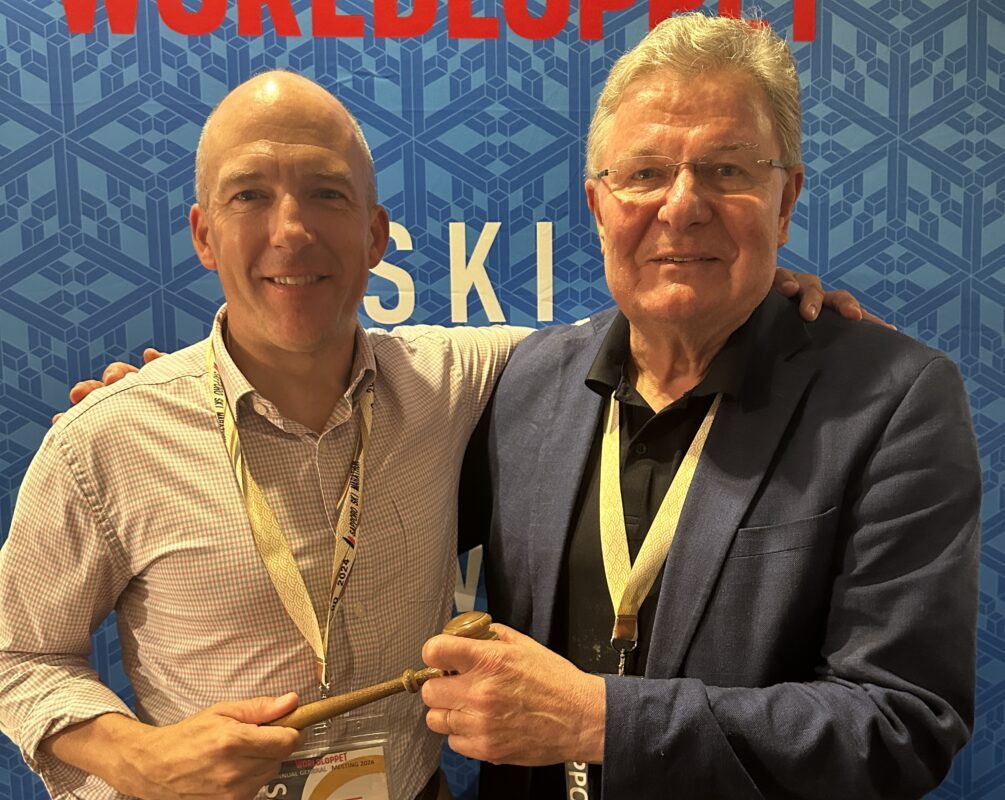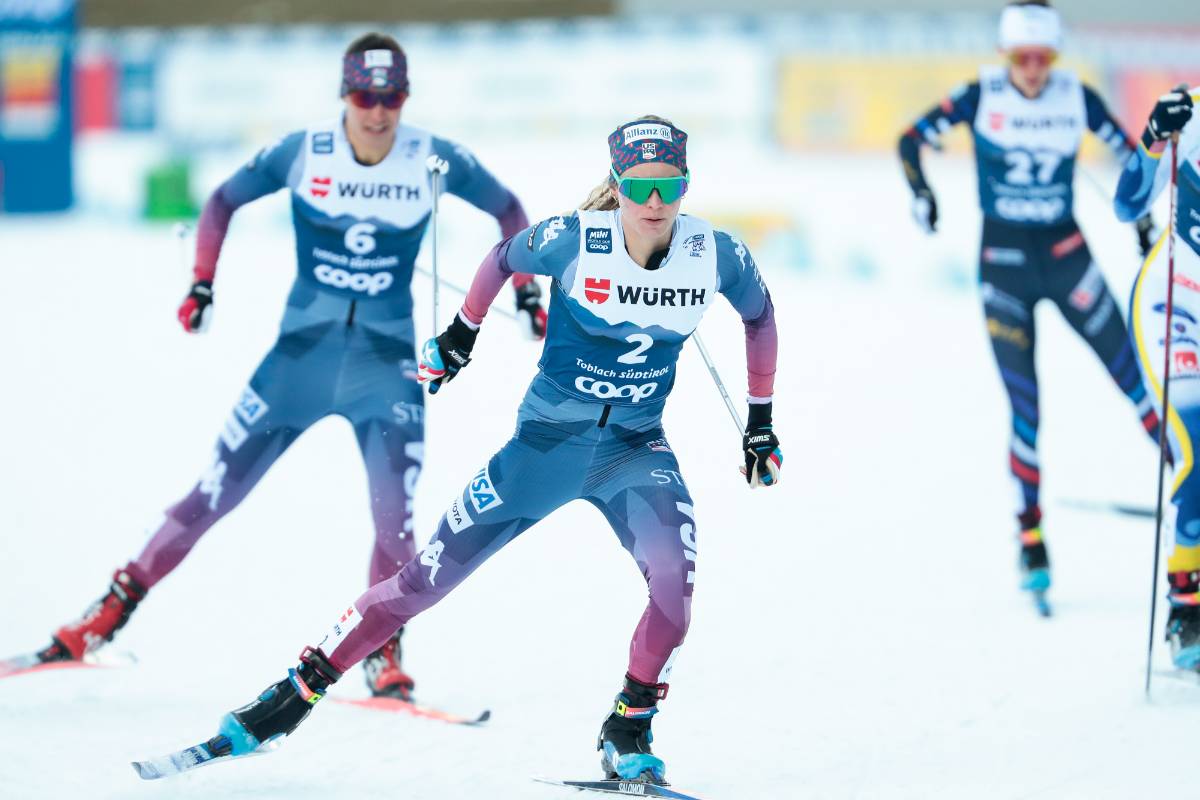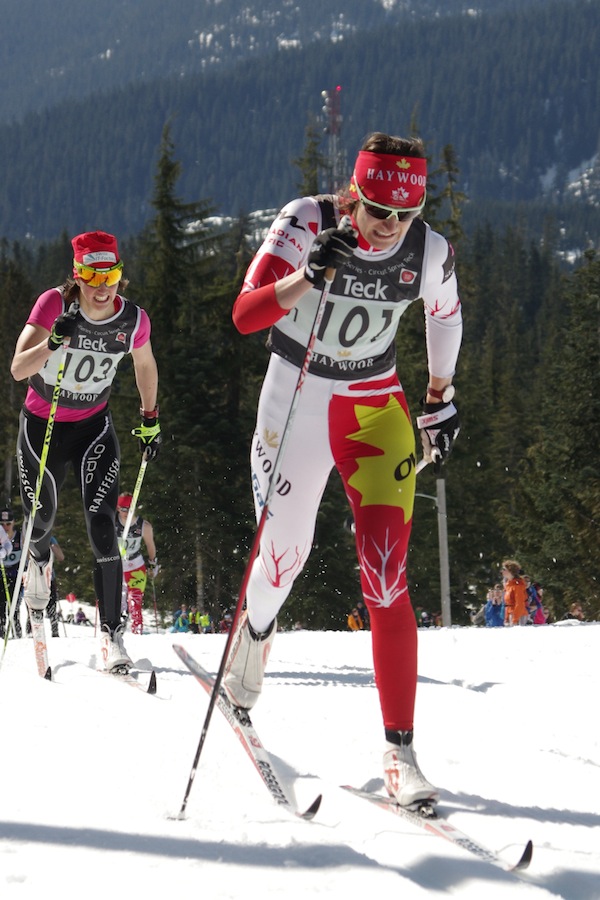
WHISTLER, B.C. – On another sunny day at Whistler Olympic Park, Canadian World Cup team members Dasha Gaiazova and Lenny Valjas set the standard, earning national titles in their favourite event – the classic sprint – on Thursday. Both won their respective 1.4- and 1.6-kilometre qualifiers at Canadian Nationals on fast, icy snow before delivering once more in the soft-and-slow finals.
Racing started early, as the para-nordic skiers and more than 300 younger racers competed in the sprints on Wednesday. By the time 75 women and 117 men finished the qualifiers on the Olympic courses, the crunchy, fast snow of Thursday morning was already turning to a thin layer of slush.
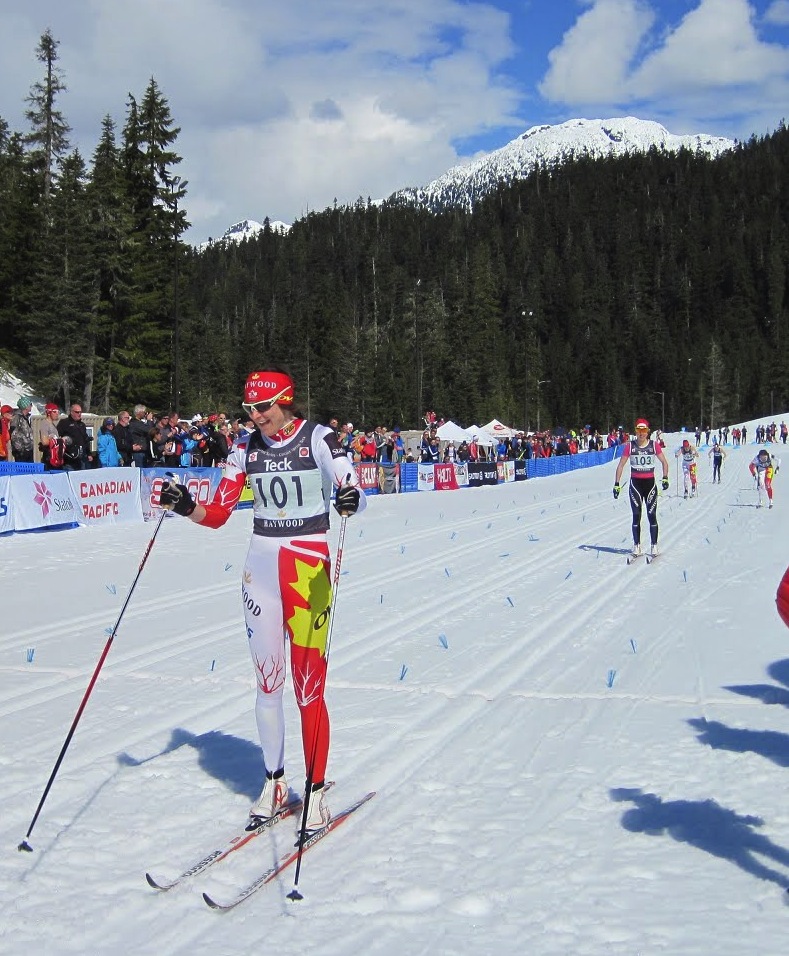
The women’s event was fairly straightforward with Gaiazova leading each heat most of the way around before finishing the 1.4 k course with a clear gap. In the final, Gaiazova coasted in with a big smile, followed by Swiss National Team skier Bettina Gruber comfortably in second. Gaiazova’s teammate, Perianne Jones over-powered Alysson Marshall of the Alberta World Cup Academy in the final stretch to take the silver medal.
“Classic sprinting, I love it!” Gaiazova said. “I had a great qualifier and it went really well in the heats.”
Still struggling with jet lag, Gaiazova came to the venue on Wednesday to watch the younger racers and award medals.
“It could be almost more fun than winning medals because you just see the joy on the faces of those people,” she said. “I got a chance to give out medals to para-skiers. It is so inspiring to see them race and fight.”
Gruber, who was second in the same event at Swiss Nationals earlier in the month and is headed to U.S. SuperTour Finals next week, was happy with her day.
“Pretty good, I would say, for just coming over to Canada,” she said. “Qualifying felt no so good; it was hard fight.”
“Qualifying was pretty icy, hard packed conditions are not my favourite,” Gruber said. “Right now, it’s pretty good, it’s a little slushy but still kind of good track.”
The second Canadian, Jones was happy with her performance. “It was really fun, and I am really happy that my season is over now,” she said.
Signing autographs before Thursday’s medal ceremony, Jones also handed out awards on Wednesday.
“It was great to be up here and see the kids race and give out medals at the end of the day,” she said. “That’s why we’re here, to see that next generation come up. It’s nice to see them race super-hard and then get to shake their hands at the end.”
Marshall collected her third individual bronze of these championships, putting a strong finish on a challenging season.
“I was feeling strong, and I was pretty close to Peri, so I am happy with that,” she said.
Marlis Kromm and Heidi Widmer took fifth and sixth for the Academy, making the A-final after winning Saturday’s team sprint.
Marshall and Gruber will be racing Saturday’s 30 k freestyle mass start, while the other podium finishers take a break. Gaiazova will be going to Russia in two weeks for a sprint race, and is resisting the temptation to do the distance race.
“The race organizers have done a great job and it’s a great venue,” she said. “It’s a pleasure to race here, for sure.”
Emily Nishikawa (AWCA), who also made time to give out awards on Wednesday, opted out of the sprints coming off some fatiguing races at World Cup Finals.
Vajlas Takes Control
In the men’s 1.6 k sprints, Valjas relied on tactics to collect his third national title in his only race at this year’s championships.
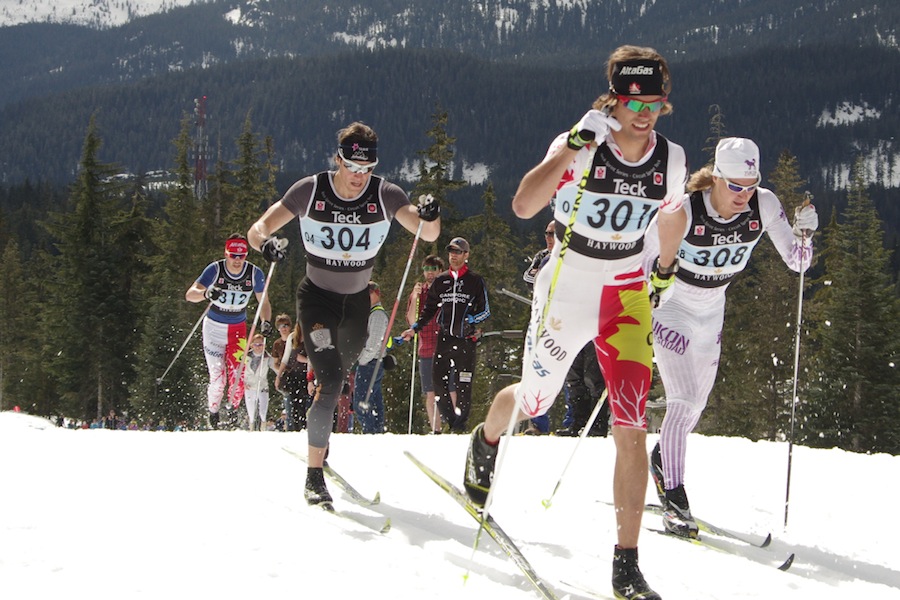
His tall build and slick skis allowed him to move to the front on every downhill. With marginal grip, he judged his efforts on the climbs and finished comfortably in the top two in the quarterfinal and semifinal. In each heat, he led into the finishing straight, taking the fastest lane in the increasingly wet snow.
In the final, Phil Widmer (AWCA) followed Valjas into the stadium and moved over a lane to start the double-pole battle. In the slower lane, Widmer was unable to stay with Valjas, and his teammate, Graham Nishikawa, took advantage of the faster tracks to steal second, nearly running over Valjas, who slowed at the line.
“I was just out here to enjoy the day and have fun,” Valjas said. “It’s been a long season and I’m happy with how it ended up.”
Asked about his backup plan for the finish, he said, “I had one extra, tiny, gear if someone did show up beside me.”
A man of few words, Nishikawa answered a question about whether he expected to get a medal in the classic sprint with “No,” and a laugh. On tactics, he was more verbose.
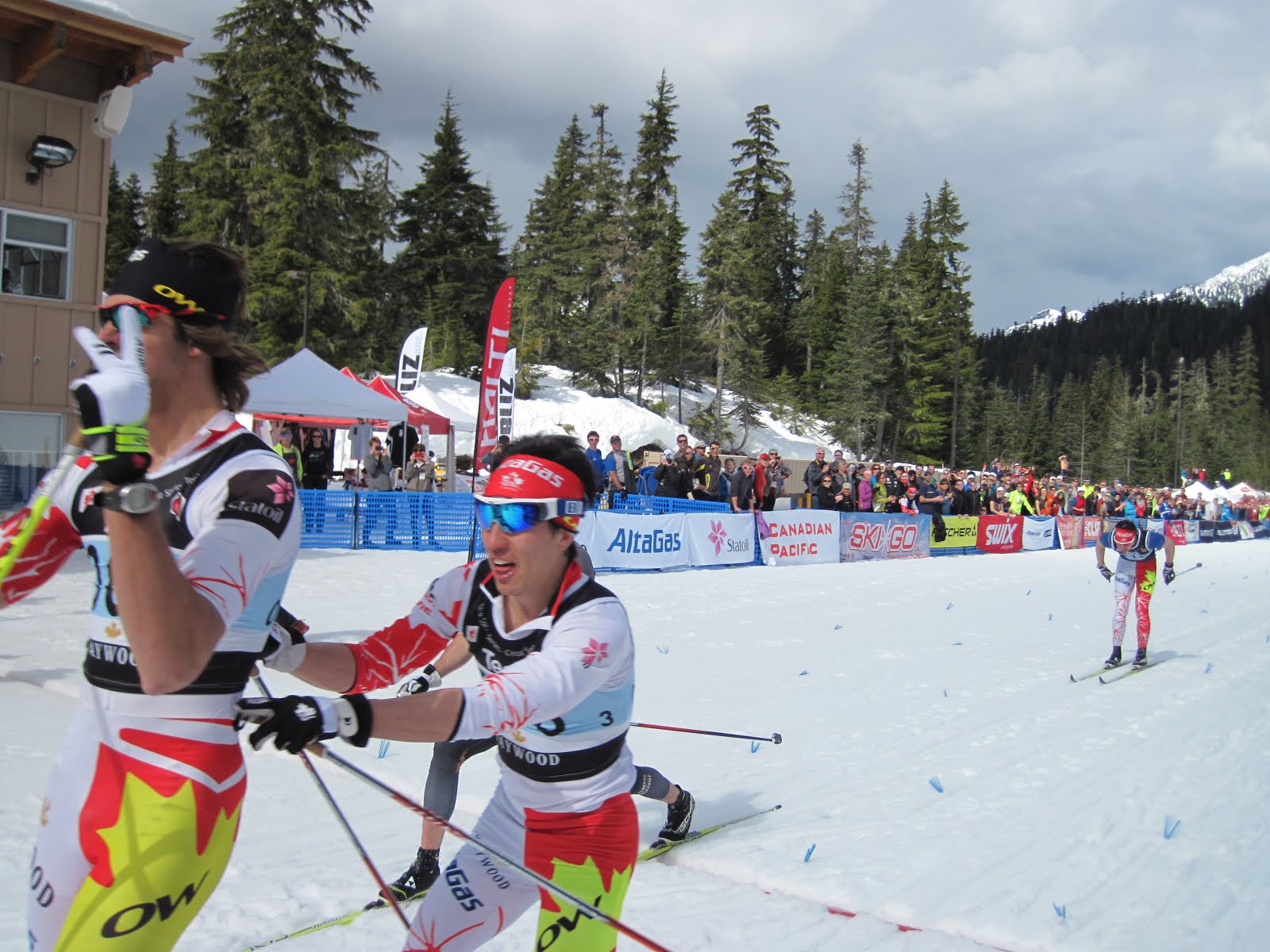
“A lot of guys [had] superfast skis,” Nishikawa said. “I think mine were right in the middle, good kick and decent speed, I got passed on the first downhill by some guys with fast skis but my strength is striding so I need the good kick.”
Widmer could have played it safe and followed Valjas for a near-certain silver, but chose to put it all out there, to the delight of the crowd.
“It is the end of the season, and the body is feeling it a little bit, but for the most part it was good,” Widmer said after the race. “It’s nice to have Lenny here and the Americans.”
Jess Cockney (AWCA) took fourth, after poor grip in the final caused him to lose ground on each of the climbs. Cockney saved his energy for a fast finish in the quarter and semi, but wasn’t close enough in the final to use his speed.
Rune Ødegärd of the University of Colorado-Boulder took fifth ahead of a breakthrough performance by Knute Johnsgaard (Yukon Elite Squad).
Two Norwegians, Ødegärd and his Colorado teammate Trygve Markset, who was ninth, were the only men to try double poling on skate skis and qualified in 16th and ninth, respectively.
After the race, Ødegärd said they made the decision so they wouldn’t have to re-wax after the qualifier. Without a support team, they skied all three heats on the same wax. Ødegärd had great skis in the quarter, gliding up from the back of the group to win, but reversed the process in the final, losing places on each downhill.
Americans Torin Koos (Bridger Ski Foundation/Rossignol) and Dakota Blackhorse-Von Jess (Bend Endurance Academy), who qualified in second and third behind Valjas, took advantage of those results in the quarters, knowing that a third place would guarantee them a lucky-loser spot.
NorAms and nationals use untimed heats to reduce the number of volunteers required. This changes the way that lucky losers are chosen from the best two times among third- and fourth-place finishers to the two lowest bib numbers who placed third.
Koos reported to the jury that he was obstructed in the semifinal and requested a spot in the A final. The jury reviewed the video and decided that there was “no evidence of obstruction.” After a 10-minute delay, the A-final was run without Koos being added as a seventh starter. He ended up 12th and did not start the B-final.


